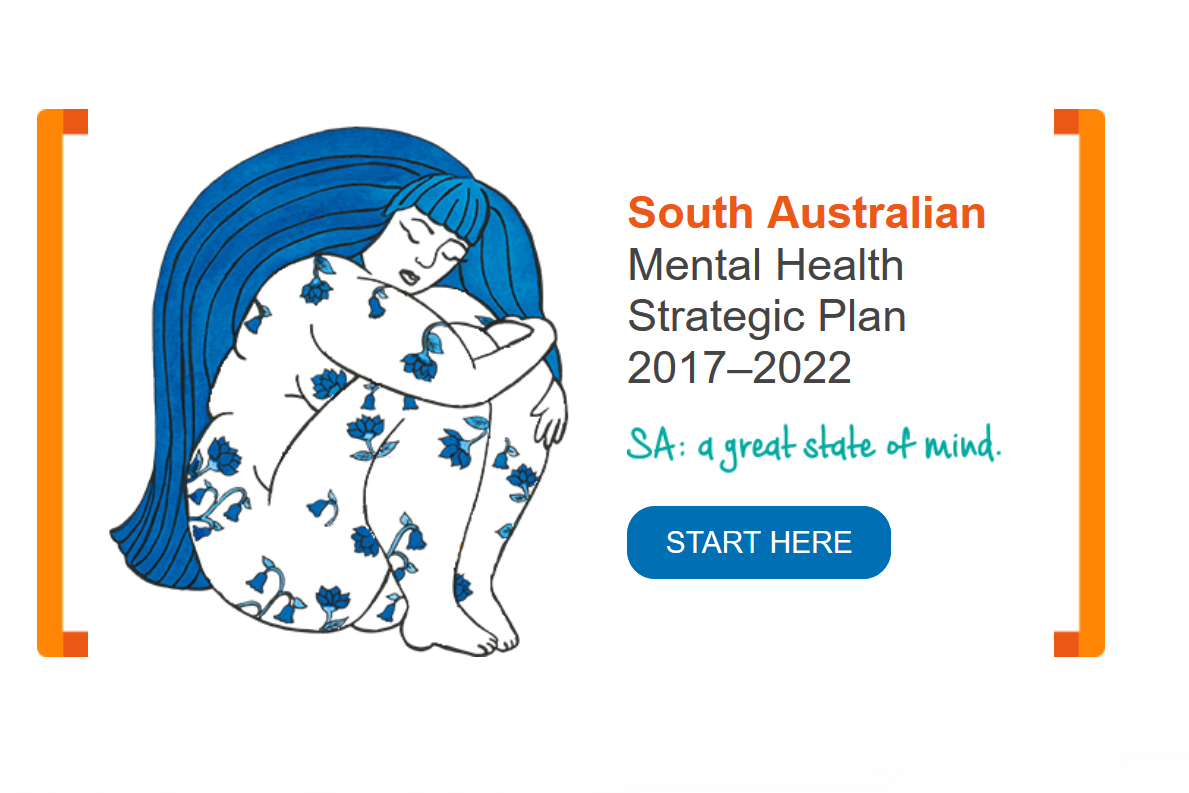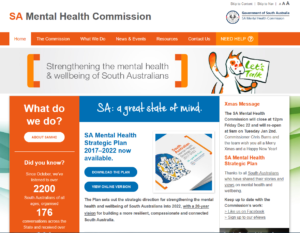
Yes, that is supposed to be a purposefully inflammatory title 🙂
So in case you did not know, South Australia has a Mental Health Commission (MHC). You can learn more about them here: http://samentalhealthcommission.com.au/

The job of the Commission is to “strengthen the mental health and wellbeing of South Australians”. A noble but admittedly broad goal.
They do this by engaging with the mental health sector (e.g. mental health treatment programs, facilities and practitioners) and the general community to understand the existing state of mental health and mental health services in SA. They then produce reports, policy proposals and education materials that seek to promote change in practice, policy and community attitudes in key areas they deem need change.
Put more simply, they try to work out what isn’t working, make suggestions for how it could work better, and put their support behind projects to make it better.
They are funded by the South Australian Government.
Over the past couple of years, the Commission has been doing a lot of consultation. I know because I’ve been involved at least 3 times in the process. Consultation typically involves talking with both those working in, and consumers of, the mental health service system. Sometimes there is no better way to understand how to improve something, than to ask those experience it every day.
That consultation has resulted in the South Australian Mental Health Strategic Plan 2017-2022 – released late in 2017
I am admittedly not a huge fan of such “strategic plans”. I don’t dislike the concept, but I have seen many plans developed, promoted but then discarded. As such I am somewhat sceptical of their worth.
However such scepticism often breeds inaction or a failure to engage. Instead I think there is significant worth in me breaking down the plan a little bit and highlighting what you (a student) can do to be a part of the process, should you feel a desire to.
OK, so what does the plan say?
Well, according to the Commission, we need to do the following in SA to build mental health. These are our “Strategic Directions“.
- More promotion, prevention and early-in-life intervention. This means trying to do stuff before people develop mental health problems. Intervening with children and in families is a key component of this. Educating people on how to stay mentally healthy is another part of it.
- More community education so that people are better educated about mental health and how to achieve it. Also, we want people who have mental health problems to feel better about seeking help and not feel ashamed or stigmatised for asking for help.
- Existing services need to work better together. For example, if you are getting assistance from both a public mental health service and an organisation like Anglicare, you’d hope that they’d communicate well with each other, and you, to provide a better service.
- Strengthen existing mental health services, particularly through making them timely (i.e. you can get in quick), localised and accessible (i.e. available to people in their local community), person-centred (i.e. involving people closely in helping plan the care that is best for them), and recovery oriented (i.e. based on idea that people with mental ilness can live active, engaged lives).
- Improve targeted services for those whose access to services is limited by geography (e.g. rural and remote communities) and/or culture (e.g. refugee populations).
- Improve ‘governance’ of services. This is really about how services are managed and doing that better. Unfortunately sentences like “identify clear responsibilities and accountabilities, develop an integrated service system, and reform funding models, to incentivise providers to work together more effectively and respond to the needs of South Australians” mean I have no idea how it would actually happen.
- Measure outcomes. Basically, implement outcome measurement in services so we can determine if those services are making people better.
Whilst these all sound lovely, they are not particularly informative about what you, as a student, can do, to be involved in making SA a mentally healthier state.
How can you get involved?
It is easy to visit the Mental Health Strategic Plan website, take a look around, and then forget it fairly quickly. This is one of the challenges of releasing these plans, is that they often don’t translate into notable changes in the system, because people read them, say “that’s nice” , then go about their day as usual.
Now admittedly, a big chunk of the responsibility of making this plan translate into actual changes is that of the Commission, the Government, and of mental health services themselves.
BUT, as a, SA resident, you too can make a difference as to whether this plan translates into noticeable improvements to mental health in South Australia.
Here are some simple ways to do so. Remember, everything you do increases the likelihood that the Commission can make meaningful changes to the mental health service system and improve the mental health of South Australians.
 Tell your friends and family about the plan and the site. Post a link to it on Facebook, or Twitter. Write a blog post about it. Send the link to a friend via email. Tell whoever you think might be interested. The more people who know about the plan, the better. Given that 50% of people in their lifetime will experience a mental health concern, it is bound to reach someone who is interested.
Tell your friends and family about the plan and the site. Post a link to it on Facebook, or Twitter. Write a blog post about it. Send the link to a friend via email. Tell whoever you think might be interested. The more people who know about the plan, the better. Given that 50% of people in their lifetime will experience a mental health concern, it is bound to reach someone who is interested.
 If you are a mental health consumer, consider asking the clinicians or workers at the services you use whether they have had anything to do with the Commission and the plan. Ask them if the service will change as a result of the plan. This might encourage those services to explore possible changes, or pressure the Commission for more assistance.
If you are a mental health consumer, consider asking the clinicians or workers at the services you use whether they have had anything to do with the Commission and the plan. Ask them if the service will change as a result of the plan. This might encourage those services to explore possible changes, or pressure the Commission for more assistance.
 Tell the commission your personal story of dealing with mental illness. It might be your experience, or the experience of a loved one, but the more stories the Commission hears, the better understanding they have of the mental health service system. Whether it is a positive or a negative story, they are all extremely valuable. It can be a little confronting to share your personal story, but in my dealings with the Commission, they have been very good at listening to the experiences of those in the mental health system. If you don’t feel comfortable telling them your story, perhaps just provide feedback on the plan itself.
Tell the commission your personal story of dealing with mental illness. It might be your experience, or the experience of a loved one, but the more stories the Commission hears, the better understanding they have of the mental health service system. Whether it is a positive or a negative story, they are all extremely valuable. It can be a little confronting to share your personal story, but in my dealings with the Commission, they have been very good at listening to the experiences of those in the mental health system. If you don’t feel comfortable telling them your story, perhaps just provide feedback on the plan itself.
 Keep up-to-date on the work of the Commission by signing up to their Newsletter or follow them on Facebook. As the Commission starts to implement the plan, there might be projects you want to get involved in. The more people who get involved, the more likely it is the projects will succeed.
Keep up-to-date on the work of the Commission by signing up to their Newsletter or follow them on Facebook. As the Commission starts to implement the plan, there might be projects you want to get involved in. The more people who get involved, the more likely it is the projects will succeed.
 Take a look and see if any of their current projects appeal to you. There might be opportunities right now you can be a part of. Currently up on their site is:
Take a look and see if any of their current projects appeal to you. There might be opportunities right now you can be a part of. Currently up on their site is:
Recruiting for a study on SMS supports for new or expectant dads
Recovery from Borderline Personality Disorder
Resources to make your workplace healthier
Final thoughts
Strategic Plans like that released by the Mental Health Commission are only as good as the energy that then follows to translate the plan into noticeable improvements.
I posed a question in the title of this post as to whether such plans are helpful or total bulls*$t. The truth is, they are as good as we make them. Making this plan successful means getting behind it in a meaningful way. For me that includes writing this post, and letting you know about the plan.
As a student, you can now play a role in this by sharing and promoting the plan, contacting the Commission, or getting involved in one of the many projects that will come out of the plan.
If you’d like to know more about how you can get involved but feel a bit stuck, feel free to contact me for ideas – details below.

